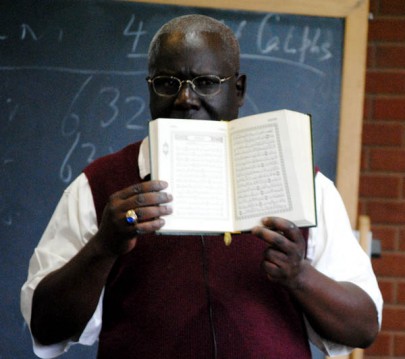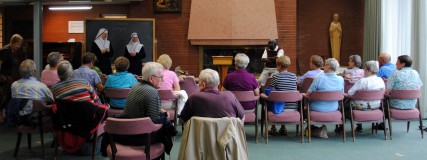
The Rev. Patrick Baraza gently placed the holy Quran on a carved wooden stand at Immaculate Heart Retreat Center, then turned to the small crowd and welcomed them to the center’s Day of Prayer.
“Today we’re going to focus on another religion that’s maybe not your own,” he said. “Muslims are our neighbors too, and if we want to know and understand our neighbors, we must learn about them….We can learn from them, and if possible, they can learn from us.”
Baraza, who was raised in Kenya, studied Islam at the University of California-Berkeley and currently teaches in the religious studies department at Gonzaga University.
He was invited to speak at Immaculate Heart as part of the center’s regular Day of Prayer program, which was attended by about 20 people.
Fran Trail, of Colville, said she came because it’s important to study other religions.
“The more we learn the better we can be,” she said.
Baraza began the program by saying many people misunderstand Islam.
“Not all Muslims are what we think we see,” he said, adding that Muslims are some of the most hospitable people he’s met.
“They’ll deny themselves everything to make you happy,” he said, recalling the time he studied in Bethlehem and became friends with Arab Muslims.
Baraza discussed four things in his two-hour presentation: the life of Muhammad, succession battles (how Sunnis and Shiites are different), Shariah Law and the tenets of Islam.
He also explained jihad, which he said is often misunderstood by non-Muslims.
“People think it’s something else. Jihad is the struggle from within,” he said.

As he told the story of Muhammad, Baraza pointed out some similarities Muslims and Christians share, particularly the esteem both faiths hold for Jesus and Mary.
“We’re here to see what we share in common. No woman is respected in Islam as much as Mary,” he said.
He explained that although Muslims do not believe Jesus to be God, he is considered to be the greatest prophet.
After Muhammad died in 632 AD, two groups of Muslims formed. Sunni’s believe the prophet’s successor should have been one of his companions. Shiite’s believed the successor should have come from Muhammad’s bloodline.
About 85 percent of the world’s Muslim population is Sunni and 15 percent are Shiite.
“The doctrine is the same, where they differ is in who should have succeeded the prophet,” Baraza noted.
That doctrine, he said, is known as Shariah Law.
“Shariah Law is the total law of God. It’s the constitution within an Islamic state,” he said.
He explained it’s made of five sources:
- Quran
- Sunnah (accounts of what Muhammad did) and Hadith (accounts of what Muhammad said)
- Ijma (consensus of the Muslim community)
- Qiyas (reason)
- Common sense
Baraza also discussed the Tenets of Islam, or the Five Pillars of Islam, which are:
- Kalima (declaration of faith)
- Salat (daily prayers)
- Zakat (charitable giving)
- Fasting
- Hajj (pilgrimage to Mecca)
Baraza said the key to understanding Islam, and other faiths, is to have an open dialogue, and not a debate.
“Dialogue,” he said, “is learning.”
Immaculate Heart hosts the Day of Prayer throughout the year. The next one will be Sept. 29 with Rev. Darrin Connall, rector of the Cathedral of Our Lady of Lourdes.






